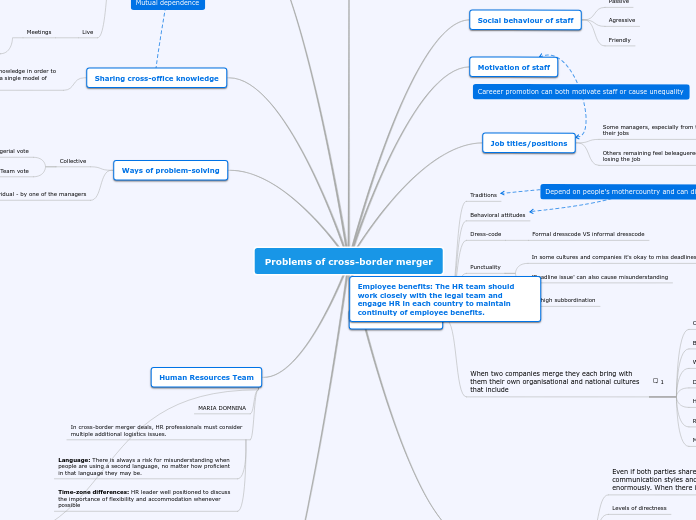Problems of cross-border merger
The role of a leader
Some members of staff can disagree with the chosen leader. It can possibly lead to mutual disrespect and misunderstanding, creating a conflict situation.
This atmoshpere unpleasant can also cause low motivation of staff
It's also important to find the most appropriate leader for a team: authoritarian, democratic, laissez-faire or transactional. It will
Social behaviour of staff
Passive
Agressive
Friendly
Motivation of staff
Job titles/positions
Some managers, especially from the acquired company, lose their jobs
Others remaining feel beleaguered because of the risk of losing the job
Cultural differences
Traditions
Behavioral attitudes
Dress-code
Formal dresscode VS informal dresscode
Punctuality
In some cultures and companies it's okay to miss deadlines
'Deadline issue' can also cause misunderstanding
Formality
Low\high subbordination
When two companies merge they each bring with them their own organisational and national cultures that include
Core values
Business practices
Working preferences
Decision-making processes
Hierarchical structures
Reward and recognition schemes
Meeting etiquette
Communication style
Even if both parties share the same language, communication styles and expectations can differ enormously. When there is a mismatch regarding:
Levels of directness
Formality
Displays of emotion
Amount of detail shared
Frequency
Method of communication
Methods of communication
ANSTASIA STEPANOVA
Distant
Teleconferences
This type of communication maybe useful in an emergency situation, when time zones lose their importance. However, during the normal daily work teleconferences may be hard to organize and hold (due to technical difficulties).
Videoconferences
This type of communication requires stable and fast internet, modern video gadgets from them the speaker`s side, may face problems of video delay during international communication. Despite the fact of technical complexity, this way of communication is a good alternative for live meetings, as the members are able to see each other (and reactions)
Social media
It is a good type for informal communication, for team bonding or informing about events, also is suitable for personal sending tasks (because people see messages almost immediately).
This type of communication is suitable for sending technical tasks, orders or documents, can be private or for a group of people, what makes the process of communication easier. However, this way of communication may be inconvenient when you need a fast reply (keep in mind time zones and the fact of other e-mails).
Live
Meetings
Of course this method is considered the best in business world, but it becomes a lot more complicated to organize a cross-boarder meeting, than the ordinary. Firstly, it is pricey for the participants. Secondly, it takes some time to gather everyone. And finally, it needs to be about some global or serious topics, otherwise it can become a waste of time.
Sharing cross-office knowledge
While joining, offices should share their knowledge in order to tune their business processes and create a single model of cooperation
Ways of problem-solving
Collective
Managerial vote
Team vote
Individual - by one of the managers
Can cause misunderstanding
Human Resources Team
MARIA DOMNINA
In cross-border merger deals, HR professionals must consider multiple additional logistics issues.
Language: There is always a risk for misunderstanding when people are using a second language, no matter how proficient in that language they may be.
Time-zone differences: HR leader well positioned to discuss the importance of flexibility and accommodation whenever possible
In cross-border merger deals, the HR team must also contend with differing national cultures, which can impact everything from work hours to leadership expectations.
Varying roles for HR: The roles and responsibilities of HR may change based on local culture. In some places, the HR team acts as “order takers,” while they act as strategic advisors in others. Be mindful that your cross-border counterparts may not have the same level of input as you. Furthermore, an HR leader may even encounter resistance to your participation or leadership during integration.
Differences in work practices: HR leaders usually find that in addition to differing response times and attitudes toward vacation and work hours, foreign labor markets are also more heavily regulated.
Human capital differences: Differences in employment practices, plans and program design can even influence how HR ask questions during the due diligence process.
Risk of poor coordination: Despite a strong need for multi-national coordination, HR leaders may encounter reluctance to adopt central control from one foreign country.
Political and regulatory issue
Political situation has major role in cross border merger and acquisitions, particularly for industries which are politically sensitive such as defence, security etc.quent to the plan of the merger is known to public.
It is also important to concerns of the parties like the governmental agencies (federal, state and local), employees, suppliers and all other interested should be addressed subse
In fact in certain cases there could be a requirement of prior notice and discussion with the labour unions and other concerned parties. It is important to identify and evaluate present or probable political consequences to avoid any probability of political risk arising.
